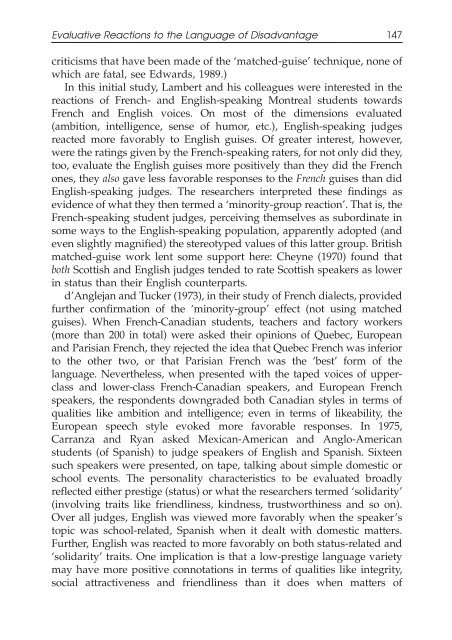Language Diversity in the Classroom - ymerleksi - home
Language Diversity in the Classroom - ymerleksi - home
Language Diversity in the Classroom - ymerleksi - home
- No tags were found...
Create successful ePaper yourself
Turn your PDF publications into a flip-book with our unique Google optimized e-Paper software.
Evaluative Reactions to <strong>the</strong> <strong>Language</strong> of Disadvantage 147criticisms that have been made of <strong>the</strong> ‘matched-guise’ technique, none ofwhich are fatal, see Edwards, 1989.)In this <strong>in</strong>itial study, Lambert and his colleagues were <strong>in</strong>terested <strong>in</strong> <strong>the</strong>reactions of French- and English-speak<strong>in</strong>g Montreal students towardsFrench and English voices. On most of <strong>the</strong> dimensions evaluated(ambition, <strong>in</strong>telligence, sense of humor, etc.), English-speak<strong>in</strong>g judgesreacted more favorably to English guises. Of greater <strong>in</strong>terest, however,were <strong>the</strong> rat<strong>in</strong>gs given by <strong>the</strong> French-speak<strong>in</strong>g raters, for not only did <strong>the</strong>y,too, evaluate <strong>the</strong> English guises more positively than <strong>the</strong>y did <strong>the</strong> Frenchones, <strong>the</strong>y also gave less favorable responses to <strong>the</strong> French guises than didEnglish-speak<strong>in</strong>g judges. The researchers <strong>in</strong>terpreted <strong>the</strong>se f<strong>in</strong>d<strong>in</strong>gs asevidence of what <strong>the</strong>y <strong>the</strong>n termed a ‘m<strong>in</strong>ority-group reaction’. That is, <strong>the</strong>French-speak<strong>in</strong>g student judges, perceiv<strong>in</strong>g <strong>the</strong>mselves as subord<strong>in</strong>ate <strong>in</strong>some ways to <strong>the</strong> English-speak<strong>in</strong>g population, apparently adopted (andeven slightly magnified) <strong>the</strong> stereotyped values of this latter group. Britishmatched-guise work lent some support here: Cheyne (1970) found thatboth Scottish and English judges tended to rate Scottish speakers as lower<strong>in</strong> status than <strong>the</strong>ir English counterparts.d’Anglejan and Tucker (1973), <strong>in</strong> <strong>the</strong>ir study of French dialects, providedfur<strong>the</strong>r confirmation of <strong>the</strong> ‘m<strong>in</strong>ority-group’ effect (not us<strong>in</strong>g matchedguises). When French-Canadian students, teachers and factory workers(more than 200 <strong>in</strong> total) were asked <strong>the</strong>ir op<strong>in</strong>ions of Quebec, Europeanand Parisian French, <strong>the</strong>y rejected <strong>the</strong> idea that Quebec French was <strong>in</strong>feriorto <strong>the</strong> o<strong>the</strong>r two, or that Parisian French was <strong>the</strong> ‘best’ form of <strong>the</strong>language. Never<strong>the</strong>less, when presented with <strong>the</strong> taped voices of upperclassand lower-class French-Canadian speakers, and European Frenchspeakers, <strong>the</strong> respondents downgraded both Canadian styles <strong>in</strong> terms ofqualities like ambition and <strong>in</strong>telligence; even <strong>in</strong> terms of likeability, <strong>the</strong>European speech style evoked more favorable responses. In 1975,Carranza and Ryan asked Mexican-American and Anglo-Americanstudents (of Spanish) to judge speakers of English and Spanish. Sixteensuch speakers were presented, on tape, talk<strong>in</strong>g about simple domestic orschool events. The personality characteristics to be evaluated broadlyreflected ei<strong>the</strong>r prestige (status) or what <strong>the</strong> researchers termed ‘solidarity’(<strong>in</strong>volv<strong>in</strong>g traits like friendl<strong>in</strong>ess, k<strong>in</strong>dness, trustworth<strong>in</strong>ess and so on).Over all judges, English was viewed more favorably when <strong>the</strong> speaker’stopic was school-related, Spanish when it dealt with domestic matters.Fur<strong>the</strong>r, English was reacted to more favorably on both status-related and‘solidarity’ traits. One implication is that a low-prestige language varietymay have more positive connotations <strong>in</strong> terms of qualities like <strong>in</strong>tegrity,social attractiveness and friendl<strong>in</strong>ess than it does when matters of
















